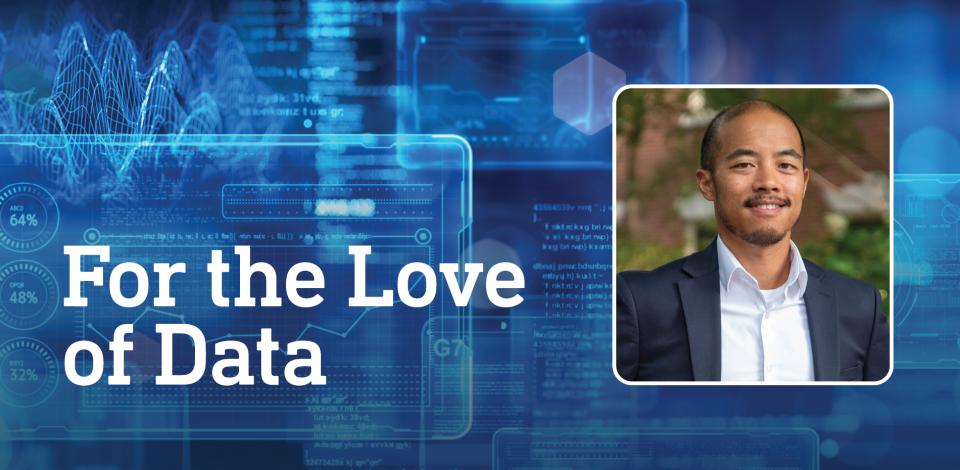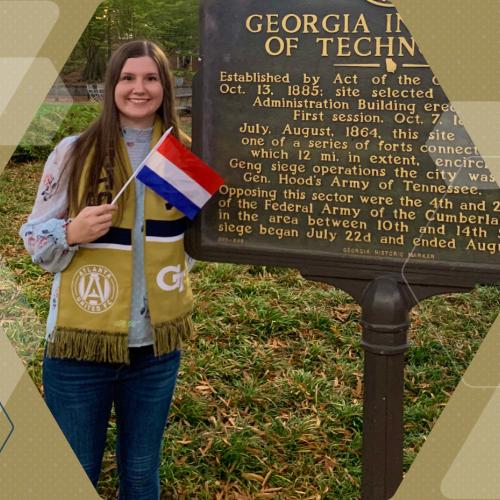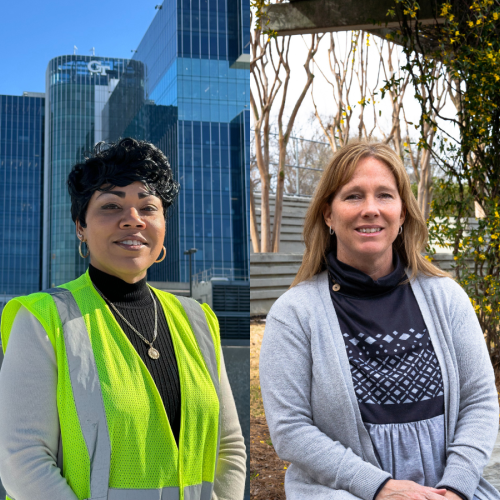Masters of Analytics-Patrick Kriengsiri, For the Love of Data
After a successful career in both aerospace and software engineering, Kriengsiri unexpectedly discovered his true love and the springboard that pivoted his life.

When Patrick Kriengsiri talks about his career, you hear the enthusiasm in his voice. There’s an energy in the way he describes what he’s doing and where he’s headed. He’s someone who genuinely looks forward to diving into his work each day - whatever it might be.
Since receiving his B.S. in Aerospace Engineering from Georgia Tech in 2002, Kriengsiri has evolved professionally in a manner that is simultaneously organic and intentional. He began his career with Lockheed Martin as a Senior Aerospace Engineer, but as technology advanced, Kriengsiri advanced with it, ultimately evolving into a principal software engineer with Siemens.
“It might seem like an odd place to have ended up for someone with an undergraduate degree in Aerospace Engineering,” Kriengsiri shares, “But it was actually a pretty natural transition – the product I was working on was one I used as an aerospace engineer with Lockheed Martin. The skill set I had developed as an undergraduate allowed me to easily transition from using the software to writing it.
While at Siemens, he decided to return to Georgia Tech to earn his Online Master of Science in Analytics (OMS Analytics). His original plan was to augment his software engineering acumen but the knowledge and insights he gained from this master’s program would change his career trajectory yet again. Below, the Double Jacket reflects on the turns his professional path has taken, and how staying alert to patterns and possibilities has fueled his journey.
You were well-established in your career - 18 years in - when you decided to pursue an advanced degree. How did that come about?
I received a random text message one day from a friend who had learned about the OMS Analytics degree and wanted to get my opinion, as a Georgia Tech alum. I actually wasn’t familiar with the program, but after doing a bit of research, I realized that what the program offered was a very good fit for my career goals.
At the time, I was trying to implement off-the-shelf machine learning solutions at Siemens but quickly realized for me to be really effective either from a planning or execution standpoint, I needed a better fundamental understanding of how the technologies worked.
So, a fortuitous text and the realization that you needed more technical knowledge led you to the OMS Analytics program. What were some of the surprises or insights you realized once you were a student?
OMS Analytics made me realize that I have always been drawn to and enjoyed working with data. Throughout my career, regardless of the industry, one of the common threads has been dealing with data, or more specifically, figuring out ways to effectively handle mountains of it and discover the story it’s trying to tell you. From my start as a junior structural engineer having to deal with the billions of data points that define the flight envelope of an aircraft, to consulting in oil and gas and providing similar solutions for analysis of oil rigs, data has been the constant in my career.
Since receiving your OMS Analytics degree, you’ve decided to change your career path and move more into data-driven roles. What have you been doing since receiving your degree?
I was in the fortunate position of having the time and flexibility to determine what was next for me, so I decided to take a sabbatical. Like many Yellow Jackets, though, I found I had a very hard time just sitting still, so when an opportunity came up to continue my affiliation with Georgia Tech in a teaching capacity, it seemed like a no-brainer. I’m currently an Instructional Associate in Georgia Tech’s Applied Analytics program.
So, was teaching also a recurring theme like data has been in your career?
Actually, yes! While I hadn't taught in a formal academic setting before, in every single one of my previous positions I provided technical education in some capacity. It was always something I ended up doing, and I always enjoyed it. So, expanding that experience and interest into academia was a very natural fit for me.
What do you enjoy about being an instructor in the Applied Analytics program?
I’m able to maintain my skill set while keeping abreast of advancements in the industry and, in a sense, pay it forward to other students going through OMS Analytics who are looking to advance their technical toolkits in the same way I was. And every semester, inevitably someone asks a question that is new and clever and forces me to think about something in a different way.
I’ve served as an instructional associate from the introductory course to the capstone project, so I’ve been able to see both ends of the spectrum. From helping to explain fundamental concepts as people are starting their journey to advising some of the same students as they leverage what they’ve learned to complete their capstone projects, it’s been extremely rewarding.
What advice do you give students now that you’re on the other side of the lectern?
I get a lot of questions from students about what classes they should take. I tell them to start with their career goals and develop a course plan based on that - figure out which courses best further those goals or are of personal interest to them.
I encourage students to choose at least one class that makes them uncomfortable and pushes them from either a technical or comfort standpoint. It will give you a better understanding of just what they’re capable of.
One course I often recommend is Human Computer Interaction, part of the Computer Science curriculum. From the course description, it sounds like it's about effective user interfaces. But it has a lot more to do with how we, as humans, process information. Having a solid understanding of that process will make you a far more effective communicator. The best analytical solution to a problem is worthless unless you can convey its values and merits to others.
Alongside teaching, what other options are you considering as you move forward in this new direction?
Currently, I’m a consultant for companies looking to incorporate analytics into their business workflow. I’m enjoying it because it allows me to leverage everything I learned in the OMS Analytics program, while also providing me unique opportunities in many different industries that I never would have had access to previously. Two projects I’m working on right now include predicting audience retention in the entertainment industry and working with a fintech startup doing a project very similar to my capstone practicum project.
And I’m back to being a student again as I pursue an MS in Computer Science at Tech.
So, you’re on your way to being a Triple Jacket?
Yes, I realized after the OMS Analytics that formal education in academia served me better than traditional MOOCs [Massive Open Online Courses]— and also I had gotten kind of addicted to learning. And if I get another degree, it’s a complete win-win! I admit the allure of being a Triple Jacket is definitely one of my big motivators.
This is an exciting and fulfilling time in my life, and it really all began with deciding to return to Tech for my OMS Analytics degree. So many possibilities have opened for me, and it has provided incredible opportunities to enhance what I’d learned in my previous careers and build skills that are truly portable across much wider fields.
Credits
Writer: Laurel-Ann Dooley
Editor: Teresa Daniel

